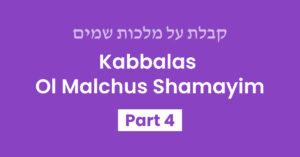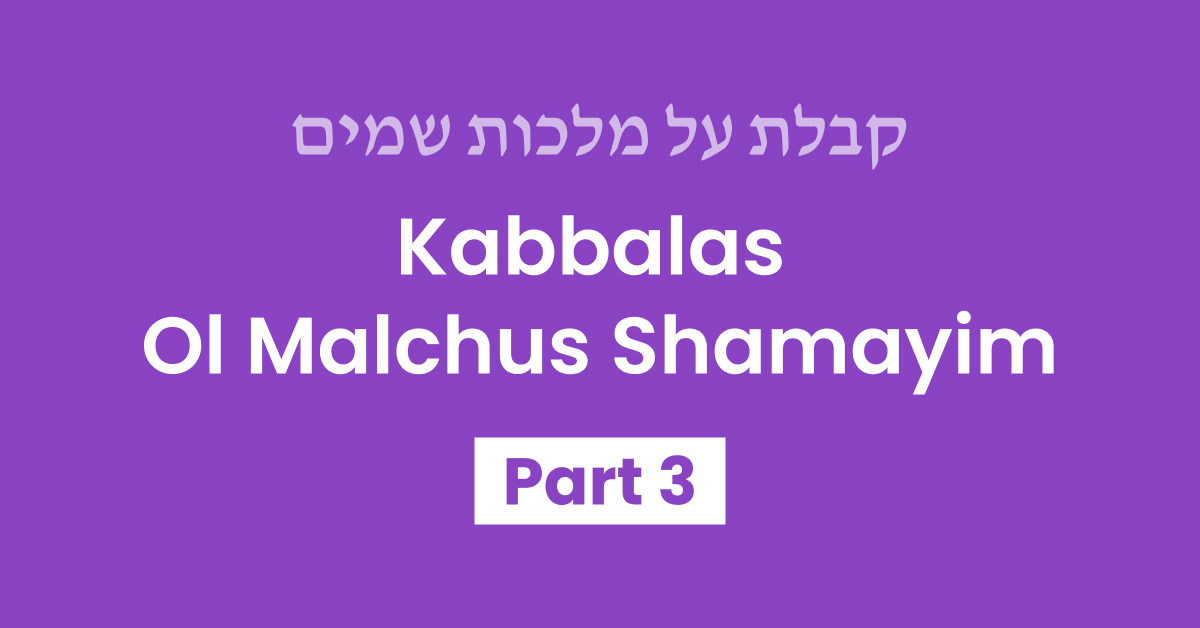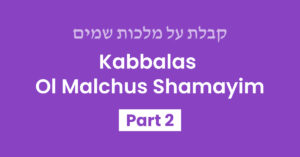We have now entered the month of Elul, which means that Rosh Hashana is just around the corner! As we all know, Rosh Hashana is our Day of Judgment, when Hashem decides everything that will happen to us in the upcoming year.
What can we do to prepare ourselves for this Day of Judgment? How can we make sure to merit a good judgment for the upcoming year?*
One answer can be found in the Gemara1 which says what Hashem wants us to do on Rosh Hashana: “Say before Me [the passages related to] Malchiyos, so that you will crown Me as your King upon you.”
The Sifsei Chaim2 writes that this Gemara is not just telling us one small obligation of the day; it’s actually telling us the secret to earning a good judgement. Crowning Hashem as our King is actually the WAY to earn a favorable judgment on Rosh Hashana.
Crowning Hashem as our King is actually the WAY to earn a favorable judgment on Rosh Hashana.
But what does this mean? How do we “crown Hashem as our King”? Isn’t Hashem the King of the world already, regardless of what we do or say? Why does He need us to agree that He is our King? And how does this help us earn a favorable judgement?
What It Means That Hashem Is Our King
Since we don’t have kings nowadays, it’s hard for us to understand what kingship means. But if we think back to older times and societies when they did have kings… what did people do to honor the king? How do people express recognition of his kingship?
We can probably imagine that it’s the greatest honor to a king when his servant says: “Yes, your majesty; your wish is my command!” A king’s will is supposed to be seen as the #1 priority and if anyone dares to transgress the king’s will, the king may decide to chop off his head. This is what it means to declare Hashem as our king: to accept Hashem’s will as our #1 priority.
This is what it means to declare Hashem as our king: to accept Hashem’s will as our #1 priority.
Imagine that a king would command you to purchase 6 apples, but on your way to the store, you pass by a street cleaner who tells you not to. Who do you listen to? Of course you listen to the King! The King’s wishes override everyone else’s! Accepting Hashem as our King, therefore, means realizing that Hashem’s will trumps everyone else’s will. No matter what Hashem asks us to do, we will do our best to fulfill His wishes.
Indeed, the Alter of Kelm writes3 that although of course Hashem is our King no matter what we do, our obligation to “crown Hashem” means we should “crown Him on every limb in our body, and on every one of our senses.” This means that we must commit to using every body part and every one of our senses – what we see, what we hear, what we think, and what we do – for doing whatever Hashem wants us to do.
Accepting to fulfill Hashem’s will as our #1 priority is called Kabbalas Ol Malchus Shamayim – accepting upon ourselves “the yoke of the kingship of Heaven.” And on the flip side, any time a person transgresses a sin, he is being “Poreik Ol Malchus Shamayim” – throwing off the yoke of the kingship of Heaven4. Instead of valuing Hashem’s will as his #1 priority, a person who fails to follow the mitzvos demonstrates that he values something other than Hashem’s will.
Accepting to fulfill Hashem’s will as our #1 priority is called Kabbalas Ol Malchus Shamayim.
Seeing It in Action
It’s not enough to be loyal to Hashem in our thoughts; we need to demonstrate our recognition of Hashem as King through our daily actions and decisions, too.
For example, a man who purposely chooses to stay in his air-conditioned home instead of going out to eat in the Sukkah shows that he values his own personal comfort over doing Hashem’s will. But if he goes out to eat in the Sukkah even when it’s hot, he is showing that he values Hashem’s will over everything else.
It’s quite easy to find opportunities to crown Hashem as King in our daily lives: Every single time we do a mitzvah, we are actively demonstrating our recognition that Hashem’s Will is our #1 priority. (In fact, the Sfas Emes5 writes that every time we do a mitzvah, we should, ideally, have in mind to be Mekabeil Ol Malchus Shamayim.)
Every single time we do a mitzvah, we are actively demonstrating our recognition that Hashem’s Will is our #1 priority.
So How Does This Help Our Judgment?
So if every time we so a mitzvah, we are demonstrating our recognition of Hashem as King, what’s unique about Rosh Hashana? Why specifically on Rosh Hashana does Hashem want us to crown Him as King, and how will this help us earn a favorable judgment?
Chazal6 teach us that Hashem created the world around Tishrei, and Adam HaRishon – the first man – was created on Rosh Hashana. Just as the CEO of a company re-evaluates each year how successful his company is in reaching its goals, Hashem takes an accounting each year of how well each one of His creations is doing in helping the world reach its ultimate purpose.7
Hashem takes an accounting each year of how well each one of His creations is doing in helping the world reach its ultimate purpose.
What is this ultimate purpose of this world? As we mentioned earlier, the entire purpose of the world is that we should all recognize Hashem as our Creator, and serve Him by fulfilling His will. In other words, Hashem wants His Kingship to be known and revealed throughout the entire world. (We daven for the world to achieve this ultimate purpose every day when we say Aleinu.)
Imagine a company called “Save the Ants, Inc.” which was founded with the mission of saving ants from becoming extinct. Every year, the CEO convenes a meeting in June, just before the start of the new fiscal year.
Mr. Jefferson, CEO of Save The Ants, Inc., opens the meeting by reiterating the company’s goals. “As you all know,” he begins, “our company takes pride in our grand mission to save ants from becoming extinct. We are proud to report that in the past year, 206,783 ants have been saved from death!” The whole room gives a round of applause, but one cynical guy in the corner, Max, gives a big yawn.
“Who cares about pesky little ants?” says Max. “I squish ants every day and I couldn’t care less. Look, I don’t really care if any ants are killed – I’m just here to earn money.” The entire room looks at Max in shock, but the CEO is not surprised. He has been watching Max carefully over the past few months and has noticed that Max has been slacking off in his work. Furthermore, Max has personally stepped on an average of 3 ants each week, which is unheard of in the offices of Save the Ants, Inc.
How likely do you think it is that Max will be re-hired for the upcoming year? Not very likely! The CEO will want to keep only his most loyal employees – workers who care about the mission of the company and will do their best to further its goals.
So too, every year on Rosh Hashana, Hashem scrutinized each of us – His “employees” – and evaluates: How much do we each care about His company’s “mission”? How much do we each care about doing Hashem’s will and revealing His Kingship in this world? Do we care about helping the world fulfill its ultimate purpose or are we too busy trying to make more money, redecorate our houses to impress the neighbors, or plan endless vacations to chill out and have fun?
How much do we each care about doing Hashem’s will and revealing His Kingship in this world?
The more we show Hashem that we care about His goal for the world – that we care about doing His Will and revealing His Kingship – the more Hashem will give us more tools, strength, and resources in the upcoming year in order to serve Him.
If we host lots of guests this year, Hashem might give us more money and a nicer home so we can do even more Hachnosas Orchim next year. If we invest a lot of effort into learning Torah, He may give us even more intelligence or a better memory so we can learn Torah even better next year. If we use our time for doing chessed and cheering people up, Hashem might give us even more time to do chessed in the upcoming year.
This is what it means that if we “crown Hashem” on Rosh Hashana, then we will merit a good judgement. If we show Hashem that we recognize His Will as our #1 priority and we care that the rest of the world should recognize this, too – then Hashem will want to keep us as part of His “company” and give us additional resources in the upcoming year.
But if someone chas v’shalom shows that he doesn’t care to fulfill Hashem’s will – he uses his money only for pursuing his own pleasures and comfort and doesn’t show any respect for Hashem’s Torah or desire to do mitzvos – then Hashem might think: “What do I need him for? He is not helping Me further My purpose for the creation of this world, so why should he deserve to get more resources?”
Although the judgement itself happens on Rosh Hashana, it’s hard to muster up all the proper feelings of yearning on that one day. The Sifsei Chaim writes8 that we have to start gearing up for this challenge the whole year, and especially in Elul! The more we practice accepting Hashem’s Will as our #1 priority during Elul, the better prepared we will be to sincerely crown Hashem as our King on Rosh Hashana.
The more we practice accepting Hashem’s Will as our #1 priority during Elul, the better prepared we will be to sincerely crown Hashem as our King on Rosh Hashana.
Sources: [1] Rosh Hashana 15a; [2] Sifsei Chaim Moadim Vol. I. pg. 116; [3] As quoted in Sifsei Chaim ibid. pg. 125; [4] Sifsei Chaim ibid. pg. 130; [5] Sfas Emes: Acharei Mos 632; [6] Rosh Hashanah 27a; [7] Sifsei Chaim ibid. pgs. 115-122; [8] ibid. pg.121
Your Challenge
Once a day, while (or before) doing a mitzvah, say out loud (or whisper) something like: “I am doing this because Hashem is my King and fulfilling His Will is my #1 priority.”
For example:
You can say this before davening, saying a brachah, washing netilas yadayim, going to shul to daven with a minyan, cleaning your house for Shabbos, cooking for Shabbos, learning Torah, taking care of children, etc.
Torah Questions
- Immediately upon awakening in the morning, we say something that acknowledges Hashem as our King. What words do we say?
- It gives great honor to Hashem when a human king honors Hashem, because it shows that Hashem is the King above all human kings… Which non-Jewish king stood up respectfully when he heard Hashem being mentioned? (See Shoftim 3:20)
- How was this king rewarded for showing honor to Hashem? (See Rashi, ibid.)
- Which Jewish king danced in front of the Aron to show honor to Hashem? (See Shmuel II 6:12-14)
- Before Kiddush on Friday night, we sing a song that refers to Hashem as “King of all kings.” Which song is this?
- Which words in “Kah Ribon Olam” mean that Hashem is King of all kings?
Questions to Ponder
- Other than accepting Hashem’s will as our #1 priority, what other implications are there for the fact that Hashem is our King? What other qualities does a king have that are unique to kings and not shared by other types of rulers?
- The Yalkut Shimoni says that as long as wicked people are ruling in the world, it’s as if Hashem is not sitting on His throne. What do you think this means? Why can’t Hashem sit on His throne even while wicked people are in positions of power, too
- The Maharal says that Hashem’s kavod (honor/glory) is called His “clothing.” What does honor have to do with clothing? Why are the two related?
- The Midrash says that Hashem’s throne is “stable” up on High, only when the Jewish people are unified below. Why do you think our unity should have any impact on the stability of Hashem’s throne?




